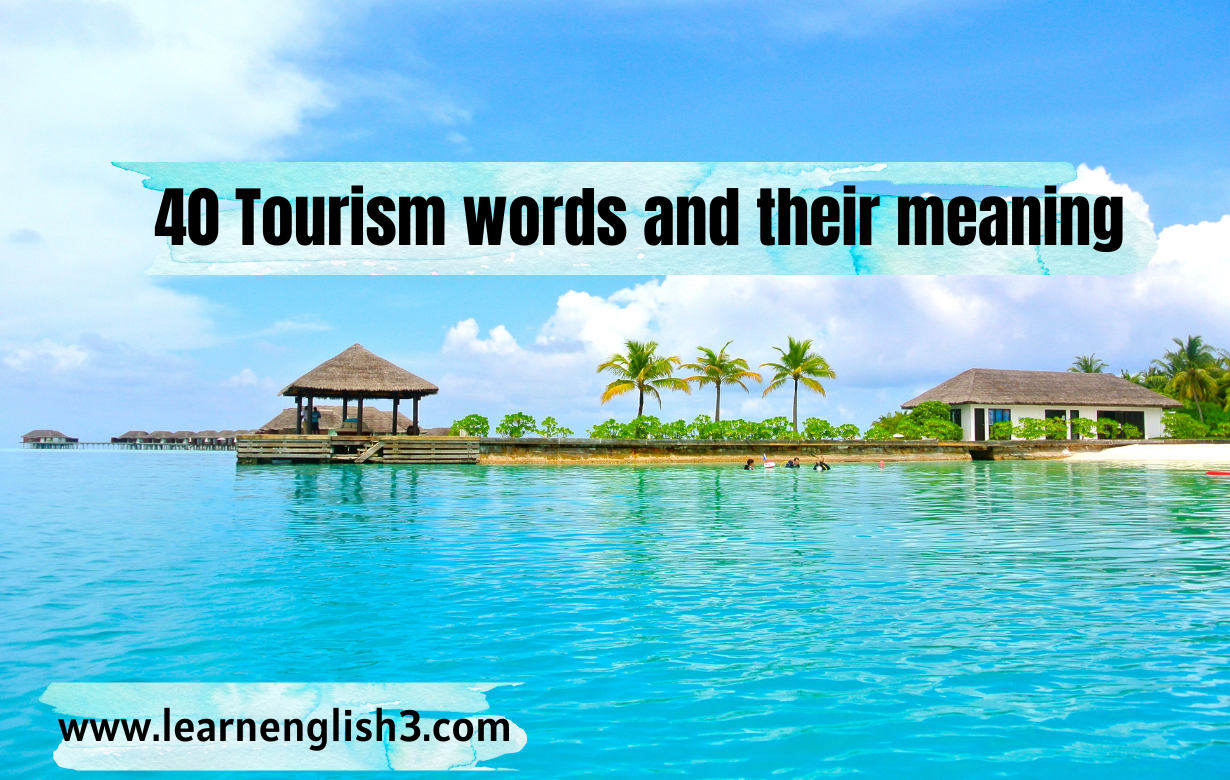Travel and tourism words and their meaning
 |
| 40 Tourism words and their meaning |
Tourist words in English covers cultural tourism terms, leisure tourism terms, hotel terms, and tourist terms in English such as hotel reservation terms and English words for hotels and interacting with them; in other words, all tourist terms. In addition to terminology like tourist and tour guide in English.
Also included are English tourist and hotel terms such as types of hotels, their employees, various types of tourism, hotel room terms, hotel services, hotel departments, hotel reception, hotel room kinds, room names, hotel room service, and any tourist lingo that a visitor may encounter, such as a hotel in English, hotel room, double room, tour guide in English, full board, a major tourism company, and tourist hotel terms.
Travel and tourism vocabulary
- Tourist: a person who goes on vacation or for leisure.
- Destination: A place where people choose to travel to and spend their vacation.
- Sightseeing is the activity of visiting famous or interesting places and landmarks.
- Attractions: places or things that are interesting or appealing to tourists.
- Itinerary: A plan or schedule of activities and places to visit during a trip.
- Accommodation: Places where tourists can stay overnight, such as hotels, resorts, or vacation rentals.
- Transportation: the means of traveling from one place to another, including options like airplanes, trains, buses, and taxis.
- Guidebook: A book providing information and recommendations for travelers, usually about a specific destination.
- Passport: An official document issued by a government that verifies a person's identity and citizenship, allowing them to travel internationally.
- Visa: An official endorsement or stamp in a passport that grants permission to enter, stay, or work in a particular country.
- Souvenir: An item purchased as a memento or keepsake of a trip or visit to a specific place.
- Cultural Exchange: The interaction and sharing of cultural experiences between travelers and the local people of a destination.
- Adventure tourism: traveling to engage in adventurous activities such as hiking, rafting, skiing, or wildlife safaris.
- Eco-tourism: responsible visits to natural places that protect the environment and advance community welfare.
- Tour Guide: A person who leads and provides information to a group of tourists during their visit to a specific location.
- Hospitality: the friendly and generous reception and entertainment of guests, usually associated with the service industry.
- Local cuisine: traditional or regional food and beverages that are characteristic of a particular area.
- Landmarks: prominent or well-known structures or locations that have historical, cultural, or architectural significance.
- Museums are institutions that preserve and exhibit collections of artistic, cultural, historical, or scientific artifacts for public viewing.
- Beach Resort: A hotel or lodging facility located near a beach, offering amenities and activities for leisure and relaxation.
- Tour: A guided journey or excursion, usually involving multiple destinations or attractions.
- Backpacking: Traveling with a backpack and usually staying in budget accommodations is often associated with independent and adventurous travel.
- A cruise is a vacation or trip taken on a large ship, typically visiting multiple destinations along a specific route.
- Resort: A vacation destination or facility that offers various amenities and activities, often located in scenic or recreational areas.
- Theme park: an amusement park or recreational attraction that features themed rides, entertainment, and activities.
- A city tour is a guided tour that takes visitors through the main attractions and landmarks of a city.
- Historical site: a place that has significant historical importance and is often preserved for its cultural or archaeological value.
- Nature reserve: a protected area of land or water set aside to preserve and conserve natural habitats, wildlife, and ecosystems.
- Ecotour: A form of tourism that focuses on visiting and appreciating natural environments while minimizing negative impacts.
- Adventure sports: exciting and high-energy activities such as rock climbing, bungee jumping, skydiving, or paragliding.
- A guided excursion is an organized trip or outing led by a knowledgeable guide to explore specific areas or attractions.
- Local culture: the customs, traditions, art, music, and way of life of the people who live in a particular region or community.
- Hospitality industry: businesses and services related to accommodation, dining, transportation, and entertainment for tourists.
- Tourist information center: a facility or office that provides tourists with maps, brochures, and information about local attractions and services.
- Travel insurance is insurance coverage that protects against unexpected events or emergencies during a trip, such as medical expenses or trip cancellations.
- Tourist visa: A temporary visa issued by a country to visitors who are not citizens or permanent residents, allowing them to enter and stay for a specific period.
- Adventure tour operator: a company that organizes and provides guided adventure tours and activities.
- Pilgrimage: A journey to a religious or sacred place, often undertaken for spiritual or religious purposes.
- Tourist-friendly: describing places or services that are accommodating, helpful, and welcoming to tourists.
- Tourist season: the period when a particular destination attracts the most tourists, often influenced by weather, holidays, or events.
These are just a few examples of common tourism-related words in English. The field of tourism encompasses a wide range of terms, depending on the specific context and activities involved.
